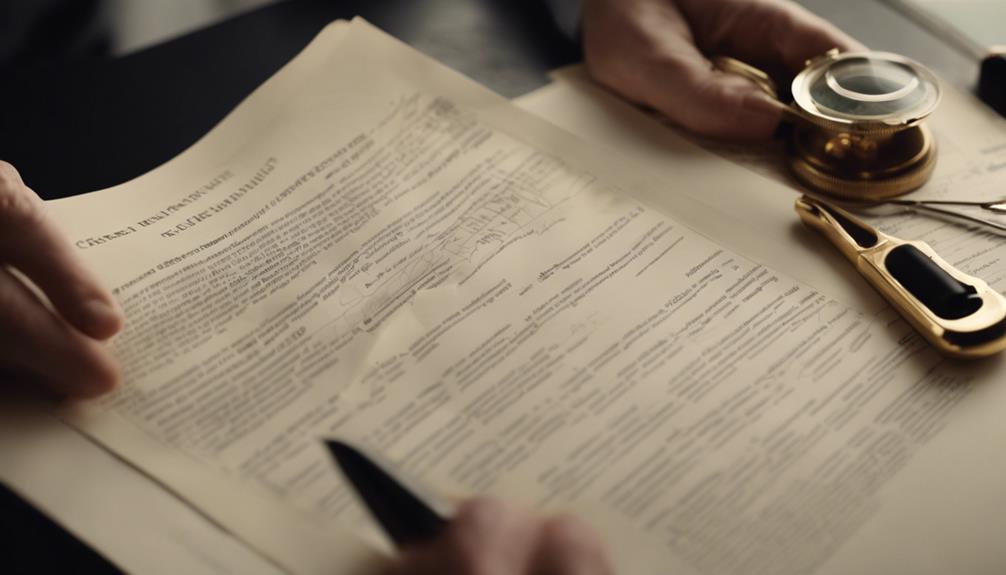Investing in a Gold IRA in New Hampshire provides unique advantages. The state does not impose sales tax or capital gains tax, making it a favorable option for precious metal investments. It is important to ensure that your gold meets the IRS’s 99.5% purity requirement and is stored in an approved depository. While profits are subject to federal taxes, familiarizing yourself with your options can help you avoid potential penalties and maximize your returns. Moreover, diversifying your portfolio with gold can offer stability in the face of market volatility. Stay tuned to discover more about local regulations and investment opportunities that can support your retirement planning.
Key Takeaways
- New Hampshire's lack of sales and capital gains taxes makes Gold IRA investments more attractive for retirement savings.
- Investors must ensure gold meets the IRS 99.5% purity requirement to maintain compliance and avoid penalties.
- Gold IRAs offer tax-deferred growth, with annual contribution limits set at $7,000 or $8,000 for those aged 50 and above.
- Precious metals must be stored in IRS-approved depositories, as personal possession is not permitted for compliance reasons.
- Diversifying retirement portfolios with 5% to 15% in gold can enhance stability and protect against market volatility and inflation.
Understanding Gold IRA Basics

Investing in a Gold IRA can be a smart move for those looking to safeguard their retirement savings. A Gold IRA lets you hold physical precious metals, like gold, in your retirement portfolio, providing a hedge against economic uncertainty and market volatility.
Understanding Gold IRA basics is vital as you consider this investment option. To set up a Gold IRA, you'll need to verify that the gold meets IRS rules, specifically a purity standard of at least 99.5%, and that it's produced by national government mints or accredited manufacturers.
Gold IRAs offer tax-deferred growth similar to traditional IRAs, allowing your investments to grow without immediate tax implications. If you opt for a Roth Gold IRA, you could enjoy tax-free withdrawals after age 59½, provided you meet specific conditions.
By allocating 5% to 15% of your investments in gold, you can effectively diversify your retirement, as gold often moves inversely to traditional financial markets.
To maintain compliance, working with an approved Custodian is essential. Noncompliance can lead to significant penalties, including the potential loss of IRA status and taxation on the entire balance.
Understanding these basics helps you make informed decisions about your retirement strategy.
New Hampshire Economic Environment

New Hampshire's economic environment is uniquely positioned to support Gold IRA investing, thanks in part to its favorable tax structure. With no sales tax or state capital gains tax, the state offers significant tax benefits for those looking to invest in precious metals like gold. This setup can enhance your retirement savings strategy, especially if you're considering a Precious Metals IRA.
Here are three reasons why you should consider investing in gold in New Hampshire:
- Sound Money Ownership: The state's motto, "Live Free or Die," reflects its commitment to individual freedoms, including the right to own sound money like gold and silver.
- Tax Advantages: The absence of state sales tax and capital gains tax means you can keep more of your investment returns, making your gold investments even more attractive.
- Evolving Legislation: New Hampshire is actively working to roll back taxes on constitutional money, indicating a growing recognition of the value of precious metals as a reliable investment.
In this supportive economic environment, investing in a Gold IRA can be a smart move for your financial future.
Local Regulations on Precious Metals

Understanding local regulations on precious metals is important for anyone looking to invest in a Gold IRA in New Hampshire. Unlike some states, New Hampshire doesn't officially recognize gold and silver as legal tender, which may affect how you view your investments. Additionally, it’s crucial to be aware of any tax implications or reporting requirements that may come with owning precious metals in the state. While New Hampshire has its own unique approach, comparing it to neighboring states, such as exploring gold IRA investing in Maine, can offer valuable insights into regional differences. Considering these factors will help ensure your investment strategy aligns with both your financial goals and local regulations.
However, the absence of a sales tax and state capital gains tax makes it an attractive environment for gold investments. Additionally, many investors are turning to reputable firms like Noble Gold for their expertise in Gold IRAs, guaranteeing compliance with regulations.
When considering a Precious Metals IRA, it's essential to remember that gold must meet a fineness standard of 99.5% to comply with IRS regulations. This guarantees that your retirement funds are allocated in a manner that meets federal requirements.
While selling gold investments won't incur state capital gains tax, you'll still need to account for federal taxes on any profits.
Recent legislative efforts in the state reflect a growing interest in sound money principles, which could influence future regulations. Staying informed about these developments is crucial for maximizing the benefits of your Gold IRA.
Tax Implications for Investors

Steering through the tax landscape for gold IRA investments in New Hampshire can greatly impact your overall returns.
You'll want to be aware of several tax implications as you navigate this investment route.
1. Contributions to gold IRAs: You can contribute up to $7,000 annually if you're under 50, and $8,000 if you're 50 or older.
These contributions can be tax-deductible, depending on your income and tax filing status.
2. Federal tax implications: While New Hampshire doesn't have a state-level capital gains tax, the federal government treats profits from gold investments as taxable income.
This means selling gold could lead to capital gains tax at the federal level.
3. Withdrawals from gold IRAs: If you withdraw funds before age 59½, you'll face a 10% federal penalty plus ordinary income tax.
However, certain exceptions may apply, so it's essential to understand your options.
Storage and Security Requirements

When investing in a Gold IRA, you'll need to store your precious metals in an IRS-approved depository, as personal possession isn't allowed.
This is vital to guarantee compliance with IRS regulations and to protect your investment.
Working with approved custodians guarantees your metals are securely stored and compliant with regulations, but be aware that this often comes with higher fees.
Understanding these storage and security requirements is essential for a successful investment strategy.
IRS-Approved Depository Storage
To comply with IRS regulations and avoid penalties, it's vital for Gold IRA investors to utilize IRS-approved depositories for their precious metals.
These storage facilities guarantee that your investments are secure and meet strict compliance standards. Remember, you can't personally possess the physical metals; qualified custodians manage all aspects of your Gold IRA.
Here are three key points to take into account when selecting an IRS-approved depository:
- Security Standards: Verify the facility has robust security measures, including insurance coverage and proper segregation of assets to protect your investment.
- Custodial Responsibilities: Custodians handle the transportation, storage, and compliance of your precious metals. Their expertise provides peace of mind, knowing your assets are in capable hands.
- Understanding Fees: Be aware that using specialized storage services often incurs higher fees. It's important to understand these costs before opening an account to avoid any surprises down the line.
Security Compliance Measures
Guaranteeing compliance with storage and security requirements is essential for Gold IRA investors. Precious metals in your Gold IRA must be stored in IRS-approved depositories, meaning you can't personally possess them. This rule is in place to guarantee compliance with IRS regulations, which helps protect your investment from penalties.
Your Gold IRA custodian plays an important role in managing the secure storage and transportation of these precious metals.
Keep in mind that working with reputable Gold IRA companies is key to guaranteeing proper metal selection and adherence to IRS guidelines. Noncompliance can lead to severe consequences, including the loss of IRA status and a hefty 10% penalty on distributions if you're under age 59½.
Understanding the fees associated with secure storage and compliance is essential for you as an investor. These fees can be higher due to the specialized services required for the secure storage of your precious metals.
Diversification Strategies

When you think about building a strong retirement portfolio, asset allocation is key.
Balancing your gold investments with stocks can help you mitigate risks while enhancing your overall returns.
Importance of Asset Allocation
A well-thought-out asset allocation strategy is essential for any retirement portfolio, especially in uncertain economic times. By incorporating a gold investment into your portfolio, you can enhance diversification and mitigate overall risk.
Allocating 5% to 15% of your retirement funds to gold can stabilize returns, particularly during economic downturns and inflationary periods. Additionally, understanding the investment strategies in precious metals can further optimize your portfolio for long-term growth.
Here are three key benefits of effective asset allocation:
- Stability During Market Volatility: Gold often moves inversely to traditional financial markets, making it a valuable asset for diversification against stock market fluctuations.
- Protection Against Inflation: Gold can help safeguard your purchasing power, resisting the inflationary pressures that erode the value of cash and bonds.
- Improved Risk-Adjusted Returns: A well-diversified retirement portfolio that includes precious metals like gold can improve your overall returns, helping you better navigate economic uncertainties.
Balancing Gold With Stocks
How can you effectively balance gold with stocks to enhance your retirement portfolio? By incorporating a gold IRA, you can diversify your investments and mitigate risks associated with stock market volatility.
Allocating 5% to 15% of your assets to precious metals like gold can provide a hedge against inflation, preserving your purchasing power when costs rise.
Historically, gold has outperformed standard stocks, with a $2,500 investment potentially growing to $20,000 over a decade, compared to modest gains in equities. This low correlation between gold and traditional assets allows you to improve your portfolio performance while reducing overall risk.
As you engage in retirement planning, keep an eye on market trends and economic indicators to make informed decisions about your investments.
Balancing gold with stocks not only enhances your portfolio's resilience during economic downturns but also positions you for better risk-adjusted returns.
Risk Mitigation Techniques
Effective risk mitigation techniques are essential for a robust retirement portfolio. One of the best ways to achieve this is by diversifying your investments. Allocating 5% to 15% of your assets into a Gold IRA can help safeguard against the risks of economic downturns and inflation, especially taking into account the historical performance trends of gold.
Here are three strategies to contemplate:
- Include Precious Metals: Adding gold and silver to your portfolio offers a stabilizing effect during market volatility, as these assets usually have a low correlation with traditional stocks and bonds. This is particularly relevant when looking at essential queries before precious metals investment.
- Mix Asset Classes: Combine equities, bonds, and precious metals in your retirement portfolio. This diversification not only reduces overall risk but also enhances your chance for better risk-adjusted returns.
- Regular Portfolio Review: Continually assess and adjust your investment composition, including your gold investments. This proactive approach helps you maintain a balanced risk management strategy aligned with your financial goals.
Market Trends and Opportunities

Gold IRA investing in New Hampshire is witnessing a surge in interest as market dynamics shift amid rising geopolitical tensions and inflation. In 2023, gold prices reached all-time highs, making gold IRAs an attractive option for those looking to hedge against inflation.
With historical data showing gold averaging returns of about 15% when inflation exceeds 3%, now's the time to reflect on how precious metals can fit into your retirement strategy.
New Hampshire's lack of a state sales tax and capital gains tax enhances the appeal of investing in gold, allowing for potentially greater returns. To effectively navigate market volatility, you should follow investment advice that suggests allocating between 5% to 15% of your retirement portfolio to gold.
This balanced approach helps mitigate risks while capitalizing on gold's performance during economic uncertainty.
Additionally, understanding IRA rules and regulations specific to gold IRAs is essential for maximizing tax-free withdrawals down the line.
Compliance With IRS Regulations

When investing in a Gold IRA, understanding compliance with IRS regulations is vital to safeguard your assets and avoid costly penalties.
To keep your investment on the right track, here are three key compliance points you should keep in mind:
- Purity Standards: Verify your precious metals meet a purity standard of 99.5% and are sourced from IRS-approved manufacturers or national government mints. This is essential for maintaining compliance.
- Storage Requirements: Remember, the IRS prohibits you from holding the metals personally. Your precious metals must be stored in IRS-approved depositories to meet regulations.
- Custodian Role: Use a knowledgeable custodian to manage your self-directed IRA. They'll facilitate funds transfers and guarantee all transactions adhere to IRS rules, minimizing your risk of noncompliance.
Failing to adhere to these IRS regulations can lead to severe consequences, including the loss of IRA status and incurring taxes and penalties.
To avoid these issues, consult with custodians about eligible gold types and stay informed about compliance standards for your Gold IRA investments.
Frequently Asked Questions
Is There Tax on Gold in New Hampshire?
In New Hampshire, you won't face state taxes on gold purchases or sales. However, keep in mind that federal taxes still apply to any profits you make from selling your precious metals.
What Are the Requirements for a Gold Ira?
Wondering what it takes to set up a Gold IRA? You'll need a self-directed IRA, meet IRS purity standards, use approved custodians, and follow contribution limits. Don't forget about withdrawal rules and penalties!
Are Gold IRAS a Good Investment?
Gold IRAs can be a smart investment, especially during economic uncertainty. They help diversify your portfolio and offer potential tax advantages. Just make sure you understand the purity requirements and allocation strategies for best results.
Is Gold Legal Tender in New Hampshire?
You might think gold's universally recognized, but in New Hampshire, it isn't legal tender. Yet, the state's lack of capital gains tax on precious metals makes investing in gold an intriguing opportunity.
Conclusion
Investing in a Gold IRA in New Hampshire can feel like exploring a treasure map—exciting but tricky. Just like finding buried treasure, understanding local regulations and market trends is essential for a successful investment. Remember, every gold coin you tuck away is a step toward securing your financial future. By staying informed and compliant, you can protect your wealth and enjoy the golden opportunities that lie ahead. So, dig in and uncover the potential for your financial prosperity!










